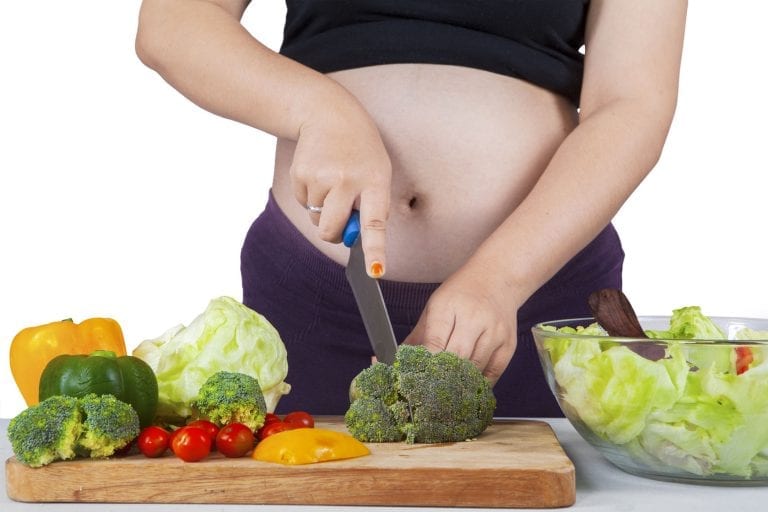Despite all of the well-meaning advice you receive, healthy eating in pregnancy doesn’t have to be overwhelming. Take it from me—a registered dietitian and a new mom—these 6 strategies are all you need!
-
Consume enough folic acid, iron and protein
It’s smart to start with a prenatal vitamin even before you’re pregnant—and to continue it after baby’s birth until you end breastfeeding. In addition to the other nutrients, your prenatal gives you folic acid to reduce the chances of neural tube defects like spina bifida. In addition to your prenatal vitamins, eat dark leafy greens, broccoli and citrus fruit to promote healthy eating.
During pregnancy, your blood volume increases to support your baby and placenta. It’s not uncommon for pregnant women to need additional iron. Consume plenty of dark leafy greens, soy, beans, lentils, seeds, and even some red meat to boost your stores. Add citrus everyday to help your body absorb more of the nutrients when you eat iron-rich foods.
Your protein needs actually double in pregnancy to support fetal growth and milk production. Many pregnant women actually fall short of this recommendation. The kind of protein you eat may be as important as the quantity, as a growing body of evidence suggests that protein requirements can be more safely met by eating more vegetable proteins rather than more animal proteins. If you haven’t met these great protein sources yet, search for recipes that include high-protein grains like quinoa, and other veggie proteins including beans, legumes, lentils, nuts and seeds.
-
Cook foods properly
All meat, fish, and eggs need to be cooked to recommended temperatures to avoid food-borne illness, specifically a bacterial infection called listeriosis. While its rare, you can encounter it in foods like lunchmeats and it can be fatal for your developing baby. To promote healthy eating and avoid food poisoning and illnesses remember the following:
- Seafood: No sushi, sashimi or raw oysters. Cooked shellfish is fine, but avoid any fresh mussels or clams that haven’t opened during the cooking process. Avoid refrigerated, uncooked seafood like nova style lox and smoked fish. It’s okay to eat smoked seafood if it’s an ingredient in a casserole or cooked dish. Canned and shelf-stable versions also are safe. Always cook fish to an internal temperature of 145º F.
- Processed meats: There’s a chance listeriosis may lurk in ready-to-eat foods such as hot dogs and deli meats because contamination can occur after cooking and before packaging. Avoid all processed meats unless you’re certain they’ve been steamed to 160º F.
- Animal proteins: All meat needs to be cooked thoroughly, this means eating and ordering all steaks to about medium well, or at least 160º F. Most meat (besides chicken) should be cooked to 160º F; this includes pork, ham, eggs, and ground meat. Chicken should be cooked to 165-180º F.
- Avoid refrigerated pâtés or meat spreads.
-
Limit caffeine
Whether caffeine in pregnancy is safe is an age-old controversy. While some caffeine is safe, it can be an issue if you consume large amounts. You’re especially sensitive to caffeine when you’re pregnant because it lingers in your system longer than when you’re not pregnant. Studies show caffeine crosses the placenta, and your baby’s developing metabolism isn’t quite ready for a java jolt. It can reduce blood flow to the placenta, affecting birth weight. When it comes to any food or drink with caffeine, take in no more than 200 mg/day. That’s about a 12-ounce up of regular coffee.
-
Skip unpasteurized products
More than just milk is pasteurized. Many soft cheeses are actually made from unpasteurized milk, and unpasteurized dairy products may contain the bacteria listeria, which can cause miscarriage. Listeria crosses the placenta and may infect your baby and can be life-threatening for your developing little one. Avoid soft cheeses such as: Brie, Camembert, Roquefort, Feta, Gorgonzola and Mexican-style cheeses that include queso blanco and queso fresco, unless they clearly state that they are made from pasteurized milk.
-
Avoid foods high in mercury
Seafood is a great source of protein for healthy eating, and the omega-3 fatty acids in many fish can promote your baby’s brain and eye development. However, some fish contain potentially dangerous levels of mercury. Too much mercury could harm your baby’s developing nervous system. Avoid fish known to have the highest levels of mercury: swordfish, shark, king mackerel and tilefish. And when it comes to canned or jarred tuna, be sure to look for tuna labeled as “light” since it tends to have less mercury than white or albacore tuna. Check the label—make sure your “light” tuna comes from skipjack, which is lower in mercury; and limit tuna servings to 2 meals a week.
-
Gain a Healthy Amount of Weight Through Healthy Eating
Half of all pregnant women gain too much weight during pregnancy. This not only makes it difficult to lose that post-baby weight, but more importantly it puts you at an increased risk for preeclampsia, gestational diabetes and birthing either a preterm or a too-large baby. Too little weight gain can also be problematic as it puts you and your baby at risk for birthing early or your baby for having a low birth weight.
You need extra calories through healthy eating, but only as many as an extra 150 up to 300 calories as you advance through each trimester. Follow this guide to gain just the right amount.






Comments are closed.